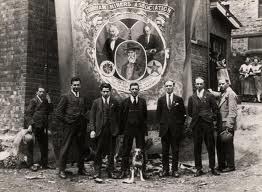I have been toying with the idea of writing a post on class for some time (in fact for most of the time this blog had been sitting dormant I have been periodically writing and abandoning drafts of this post. I have been spurred to action by this week’s #MuseumHour, which skilled over from its allotted 8-9pm schedule and had museum tweeters in heated debates for most of Monday evening. I have a lot of thoughts which I found hard to express in a tweet.
Why have I found it so hard to write about this so far? I think for the same reason many people in that museum hour were reticent about identifying as working class. It feels very personal, like you have to expose your family history, your financial situation, your level of education, your life choices, to justify the class identity which you feel most closely aligned with. One of the first questions was about the demographic makeup of your workplace. Most people seriously struggle to answer this. I could not say with confidence which class the members of my own small team considers themselves to be. It feels rude to ask. It’s an incredibly loaded question.
It is personal, and in todays’s society each personal experience will be unique. Many expressed confusion as to their class because while their parents were traditionally working class, they had been to university and joined the very middle class museum profession, so weren’t they now middle class too? My own class identity is more confused. For many families upward class mobility has left younger generations feeling confused. For my family the last century was a game of snakes and ladders from blacklisted miners moving from the North East to Kent after the General Strike, where subsequent generations found themselves in more comfortable white collar situation and finally, through various rolls of the dice, to the single parent household I grew up in, where no one worked at all. Part of the difficulty in figuring out where you sit in today’s complicated class structure is unpicking these twists of fate and upward and downward mobility. For years I felt uncomfortable defining myself as working class because there was not an easy narrative of proud ‘hard-working families’ in my personal history. It is uncomfortable to share it now but I do so to make the point that class is not simple or easy to define. People’s fortunes can change and in the current climate they are more likely to go down than up.
The reason I define myself as working class, ultimately, is that growing up I did not have financial security. I don’t have financial security now, despite my middle class job title and two degrees (which I am still paying for). Yes there is a conversation to be had about snobbery in the sector and people being made to feel uncomfortable or patronised because of their class, but the number one problem museums have when it comes to class (and in diversifying the workforce in general) is that this sector is inhospitable to people without economic security, who have to earn a living for themselves, and who cannot rely on parents or partners to provide financial support.
This seems so fundamental to me. It frustrates me when people talk about encouraging young people from more diverse backgrounds to see museum work as a possible career. It’s not that we shouldn’t raise aspirations, but when there is no stability or security in that world how can you encourage young people to set themselves up for a fall? The fact is museum work, once the preserve of the gentleman collector, and even now in its current form, is not designed for people who really need to earn a living. The low pay may be tolerable if you come from a place of economic privelege to begin with, if you have savings and have not had to run up huge debts to get your qualifications, if you have financial support or can live at home while starting out. When you are on the back foot to begin with it can be crippling. Being a curator may mean I have a middle class job, but I don’t have a middle class lifestyle. At 31 I still earn considerably less than the national average wage. I feel lucky to now be at a stage in my career where I can apply for jobs which do pay more, but it has been a struggle to get here. Again I am not sharing personal details because I want to air my dirty laundry but because I think we need to talk openly about the barriers we face in the museum sector in order to create change.
We need to talk openly about class if we are going to make museum work accessible to a wider range of people. When we find accepted working practises, such as the obligation to work for free, to be unacceptable we need to say so. There are many ways to define class, and some of them are abstract, academic, hard to grasp or explain, but economic disadvantage is real and it is concrete. It is not a barrier that is easy to remove in a sector so reliant on an eager supply of young volunteers and unpaid interns, but there are steps which can be taken: fairer recruitment, more flexible volunteering opportunities which acknowledge the need for volunteers to earn a living too, more mobility within organisations through workforce development.
As a foot note, I mentioned earlier my feeling growing up that I didn’t have a proud working class heritage. It turns out, as I found through the magic of museums and archives (though the original evidence doesn’t seem to be online anymore) that I do. This picture shows my great grandfather and his brothers with their union banner. That’s Marx and Lenin. Turns out they were pretty radical.
